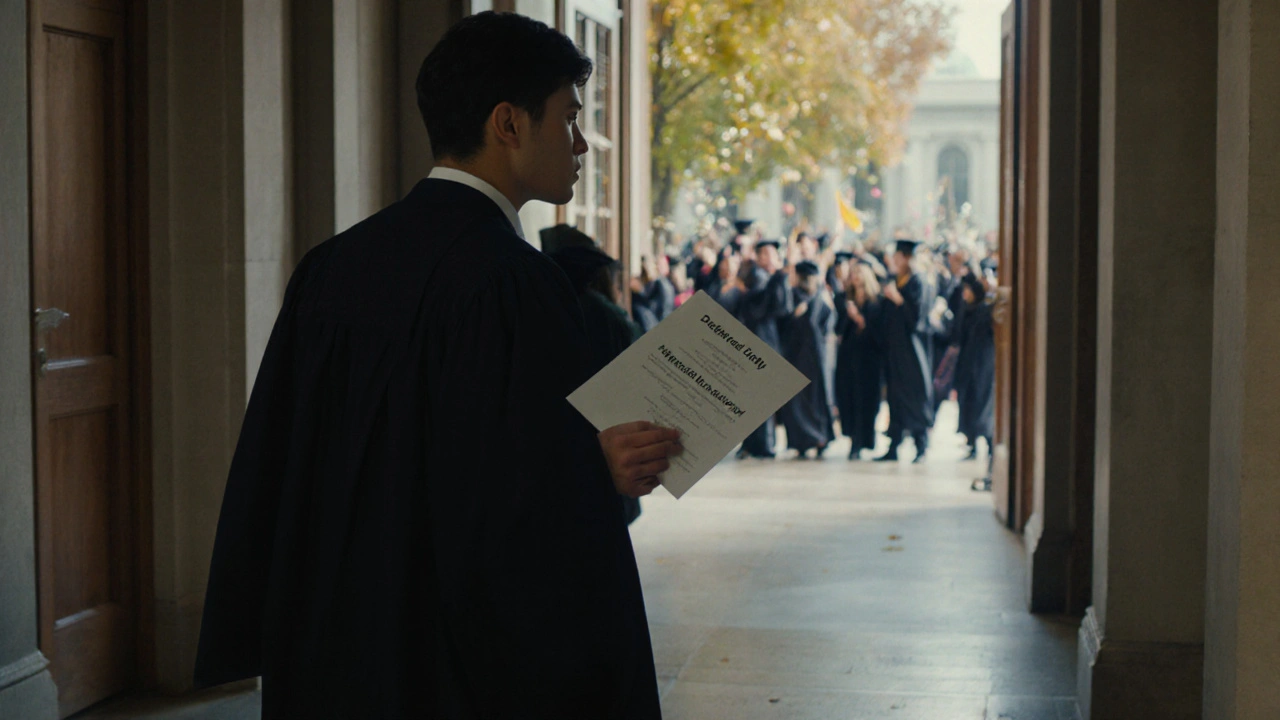
More than 20,000 students in the UK defer their university entry each year. That’s not a small number-it’s about one in every eight new undergraduates. But what does that really mean for you? If you’re thinking about taking a year off before starting uni, you’re not alone. But you’re also not immune to the risks. A gap year can recharge you, clarify your goals, or even boost your grades. Or it can drag on, cost you money, and leave you feeling more lost than when you started.
What Exactly Is Deferred Entry?
Deferred entry in the UK means you’ve been accepted to a university, paid your deposit, and signed your offer letter-but you’ve asked to start your course a year later. It’s not a rejection. It’s not a waitlist. It’s a formal agreement between you and the university to begin your studies in the next academic year instead of the current one.
Most UK universities allow deferred entry, especially for courses like medicine, engineering, and psychology. But not all do. Some competitive programs, like Oxford’s PPE or Cambridge’s Natural Sciences, rarely approve deferrals unless you have a solid, documented plan. Always check with your chosen university before making any commitments.
When you apply through UCAS, you’ll see a box labeled "Apply for deferred entry." Tick it, and you’ll be asked to explain why. This isn’t just a formality. Universities use your reason to decide whether you’re serious or just procrastinating.
Why Do People Take a Gap Year?
People don’t take gap years for the same reasons. Here are the most common ones-and what actually happens in real life.
- Travel and cultural exposure: Many students want to see the world before settling into academic life. Working abroad in Australia, volunteering in Nepal, or teaching English in Spain gives perspective. One student I spoke with spent six months in Portugal learning Portuguese and working in a hostel. She came back more confident, fluent, and with a clearer idea of what she wanted to study.
- Work and saving money: University costs are rising. Tuition fees are £9,250 per year in England, and living expenses can add another £12,000. A year of full-time work-say, as a barista, warehouse worker, or intern-can cover a full year’s rent and books. One student saved £10,000 working in London before starting his engineering degree. He didn’t need a single loan.
- Academic recovery: If your A-levels didn’t go as planned, a gap year lets you retake exams, take an access course, or improve your personal statement. Some students use the year to gain relevant experience, like shadowing a doctor or interning at a lab, to strengthen their application.
- Mental health and burnout: After two years of pandemic disruptions and exam pressure, many students feel exhausted. A gap year gives space to heal. A 2024 study by the UK’s Higher Education Policy Institute found that students who took a gap year for mental health reasons reported higher satisfaction with their university experience than those who went straight in.
- Uncertainty: "I don’t know what I want to study" is a valid reason. But it’s also risky. Without structure, a year of uncertainty can turn into a year of aimlessness.
What Universities Want to See
Universities aren’t against gap years. They’re against empty ones.
If your reason for deferring is "I just need a break," you’re likely to get rejected. But if you say, "I’ll be working as a research assistant at a local hospital to gain clinical experience before applying to med school," you’re much more likely to get approval.
Here’s what admissions teams look for:
- Structure: Do you have a daily or weekly plan? Are you tracking progress?
- Relevance: Does what you’re doing connect to your future degree? Even indirectly?
- Reflection: Can you explain what you learned-not just what you did?
Some universities even ask for a written plan or a letter of support from an employer or volunteer coordinator. Don’t treat this like a formality. Treat it like a job application.

The Hidden Costs of a Gap Year
It’s easy to romanticize a gap year. But here’s what nobody tells you:
- You might lose momentum. The longer you’re away from academic routines, the harder it is to jump back in. One student I interviewed took a year off to travel, then started uni and couldn’t focus. She dropped out after six months.
- Financial strain. If you’re not working or earning, you’re spending. Accommodation, flights, insurance, visas-these add up fast. A gap year can cost £5,000 to £15,000 depending on where you go.
- Peer pressure. Your friends will be starting university. You’ll be working in a café, cleaning houses, or living with your parents. That can feel isolating.
- Missed opportunities. Some scholarships, internships, and bursaries are only open to students entering university directly. You might lose eligibility.
And if your gap year doesn’t go as planned? You might end up starting uni with less money, less confidence, and more regret.
How to Make Your Gap Year Count
Here’s how to turn a gap year from a pause into a pivot.
- Set clear goals. Write them down. "Learn Spanish" is vague. "Complete a B1 Spanish course, pass the DELE exam, and volunteer with a refugee organization in Barcelona" is specific.
- Get a job or internship. Even if it’s unrelated to your degree, it teaches responsibility, time management, and professionalism. Employers care about these skills.
- Track your progress. Keep a journal. Take photos. Save receipts. These become evidence for your personal statement and interviews.
- Stay connected to education. Read one book a month related to your course. Take a free online course (Coursera, FutureLearn). Attend a webinar. Don’t let your brain go cold.
- Plan your return. Set a date to start applying for student housing, book your flights, and re-read your course syllabus. Don’t wait until August to think about it.
One student I met spent his gap year building a small website for local businesses. He learned HTML, CSS, and basic UX design. When he started his computer science degree, he was already ahead of his classmates. He didn’t just survive-he led.

When Not to Take a Gap Year
Not everyone should wait. Here’s when it’s a bad idea:
- You’re avoiding university because you’re scared of failure.
- You don’t have a plan, and you don’t want to make one.
- You’re waiting for "the right time"-but that time never comes.
- You’re doing it because your friends are.
- You can’t afford it and won’t earn enough to cover costs.
If you’re unsure, try a hybrid approach: take a short break (4-8 weeks), then start university. You’ll get some rest without losing momentum.
What Happens After the Gap Year?
Once your deferral is approved, you’re still bound by the same rules as everyone else.
- You must still meet your offer conditions. If your offer was AAB, you still need AAB when you apply again-unless you’re retaking exams.
- You’ll need to reconfirm your place with UCAS in the next cycle. Don’t assume it’s automatic.
- Some universities require you to reapply through UCAS as a deferred applicant, even if you already got in.
- Student finance applications need to be renewed. Your maintenance loan won’t carry over automatically.
One student thought her deferral was locked in. She didn’t reapply through UCAS and lost her place. She had to reapply the next year-and missed out on housing and scholarships.
Final Thought: Is It Right for You?
There’s no universal answer. For some, a gap year is the best decision they ever made. For others, it’s a year they wish they could get back.
Ask yourself:
- Do I have a plan that’s more than "I want to travel"?
- Can I afford it without going into debt?
- Will I still be excited about my course in 12 months?
- Am I doing this to grow-or to escape?
If you can answer "yes" to the first three, and "not to escape" to the last, then go for it. Structure it. Document it. Own it.
If not? Start university. You can always take a break later-after you’ve found your footing.
Can I defer my university offer if I didn’t originally apply for deferred entry?
Yes, but only if your offer is still open and the university agrees. You need to contact the admissions office directly as soon as possible-usually before the start of term. Some universities allow it; others don’t. There’s no guarantee. It’s much easier to apply for deferred entry upfront.
Will taking a gap year hurt my chances of getting into a top university?
Not if you use the time well. Top universities like UCL, Imperial, and Durham value applicants who show initiative, maturity, and purpose. A gap year spent working, volunteering, or gaining skills can strengthen your application. But if you just sit at home or travel aimlessly, it won’t help-and might raise questions.
Can I work during my gap year and still get student finance?
Yes. Your earnings during your gap year don’t affect your eligibility for student finance in the UK. Student Finance England (and its equivalents in Scotland, Wales, and Northern Ireland) assesses your household income from the previous tax year. So if you worked in 2025-2026, they’ll look at your 2024-2025 income. That means you can earn without penalty.
What if I change my mind about my course during my gap year?
You can switch courses-but you’ll need to contact the university and possibly reapply through UCAS. If you’re switching to a completely different subject, your original offer may be withdrawn. Some universities allow you to change your course before starting, but only if there’s space and your background fits. Don’t assume you can just switch on day one.
Do I need to reapply to UCAS after my gap year?
No, if you’ve been accepted with a deferred entry. Your original UCAS application stays active. You just need to confirm your place by the deadline (usually August) and complete your student finance application for the new year. But if you didn’t apply for deferred entry initially, you’ll need to reapply through UCAS as a new applicant.